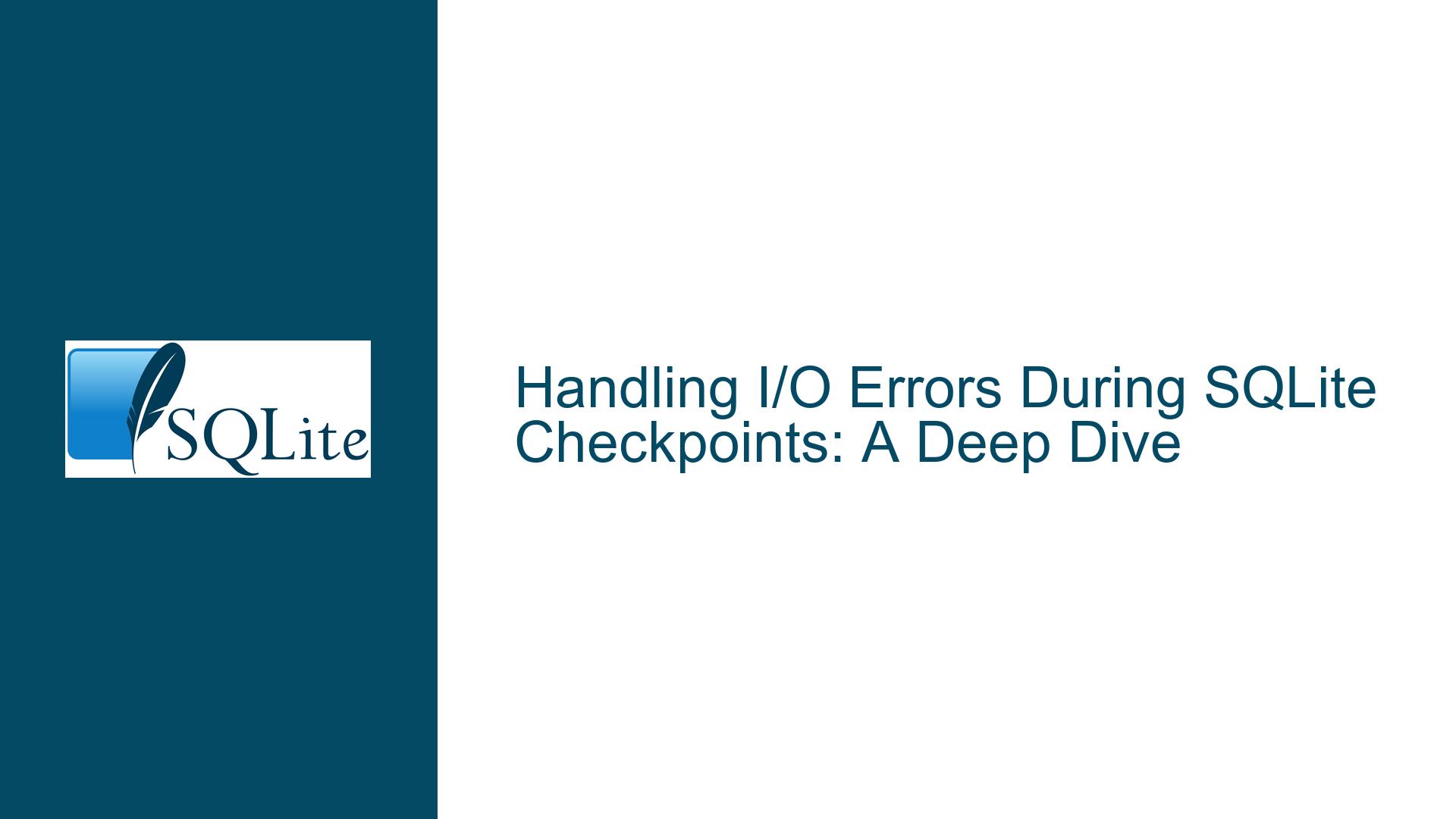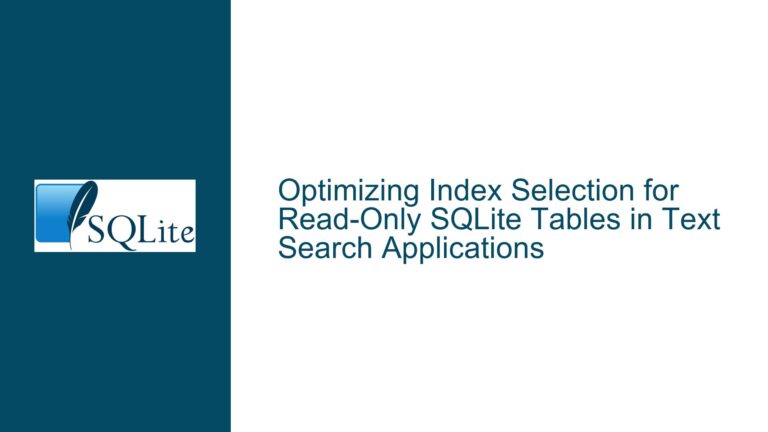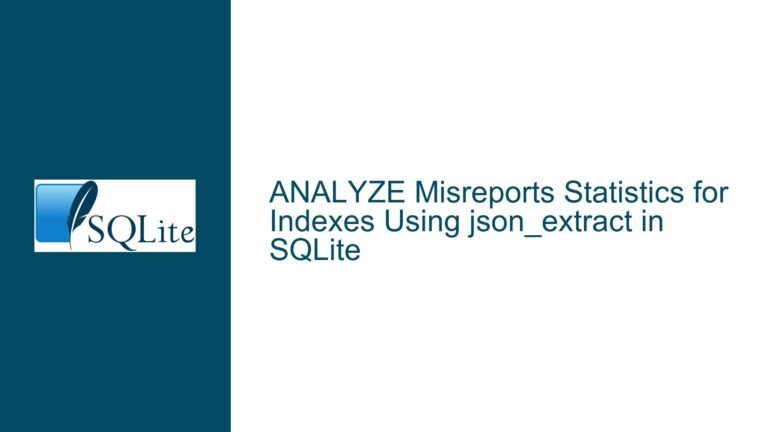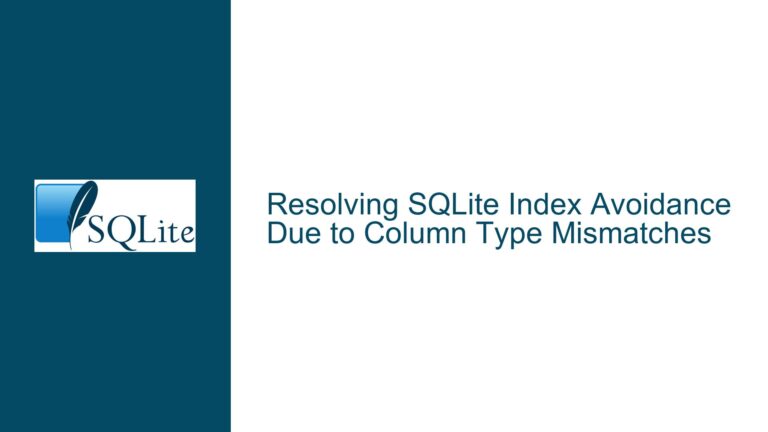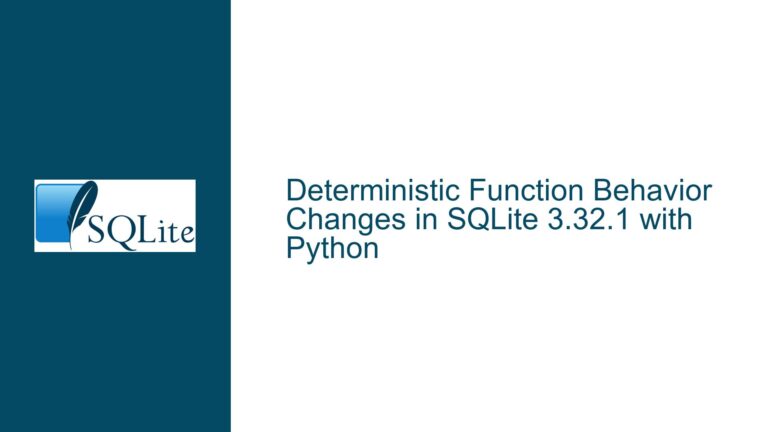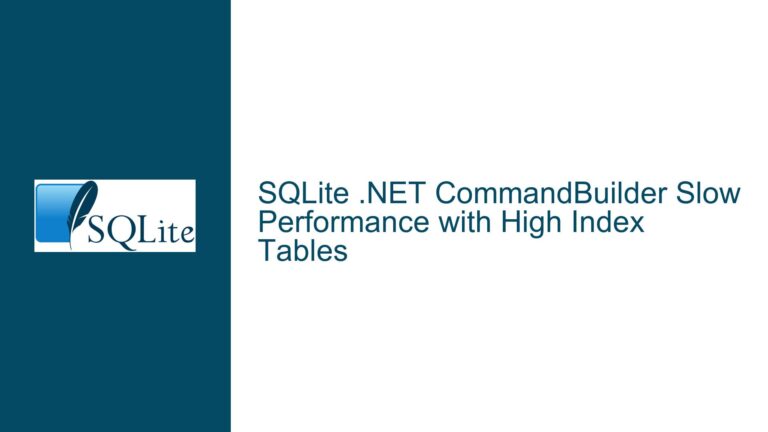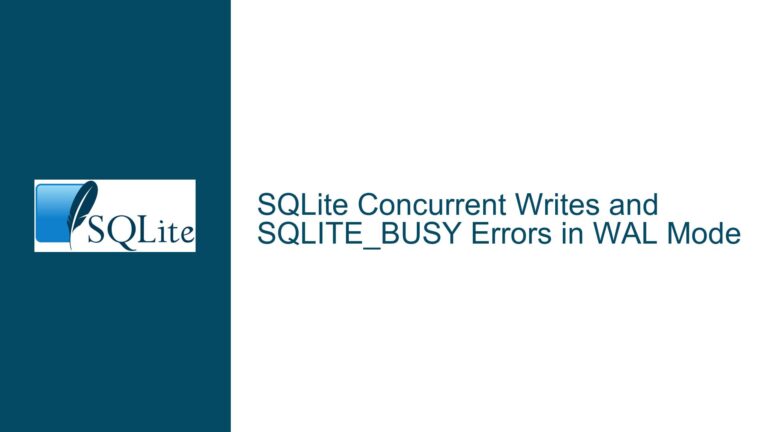Handling I/O Errors During SQLite Checkpoints: A Deep Dive
Issue Overview: I/O Errors During Checkpoints and Their Impact on Database Integrity
When working with SQLite, particularly in scenarios involving Write-Ahead Logging (WAL) mode, checkpoints play a crucial role in ensuring data consistency and durability. A checkpoint operation is responsible for transferring data from the WAL file back into the main database file, thereby maintaining a single source of truth for the database state. However, the process is not immune to failures, especially when I/O operations are involved. The core issue at hand revolves around how SQLite handles I/O errors that occur during a checkpoint operation, particularly when these errors are not properly propagated or handled, potentially leading to partial writes and database corruption.
In a typical checkpoint operation, SQLite reads pages from the WAL file and writes them to the main database file. If an I/O error occurs during this process—such as a failed read from the WAL file or a failed write to the database file—the checkpoint operation may terminate prematurely. The concern arises from the fact that, in the case of an explicit checkpoint (triggered by sqlite3_wal_checkpoint or sqlite3_wal_checkpoint_v2), the error code is propagated back to the caller, allowing for potential recovery actions. However, in the case of an automatic checkpoint (triggered by SQLite’s internal mechanisms), the error is not always detected or handled appropriately. Specifically, the sqlite3WalDefaultHook() function, which is responsible for handling automatic checkpoints, does not check for errors returned by sqlite3_wal_checkpoint() and always returns SQLITE_OK. This behavior can lead to undetected errors, leaving the database in an inconsistent state.
The implications of this issue are significant. If a checkpoint operation fails midway due to an I/O error, the database file may contain partially written transactions. While SQLite’s design ensures that readers will continue to read from the WAL file rather than the partially updated database file, the lack of error handling in automatic checkpoints means that the failure may go unnoticed. Over time, this could lead to a buildup of inconsistencies, especially if the same pages are repeatedly involved in failed checkpoint operations.
Possible Causes: Why I/O Errors During Checkpoints Are Not Always Handled Correctly
The root cause of this issue lies in the way SQLite’s checkpoint mechanism is designed, particularly in how it handles errors during the checkpoint process. There are several factors that contribute to this behavior:
Error Propagation in Explicit vs. Automatic Checkpoints: When a checkpoint is initiated explicitly via
sqlite3_wal_checkpointorsqlite3_wal_checkpoint_v2, any I/O errors encountered during the operation are propagated back to the caller. This allows the application to take corrective actions, such as retrying the checkpoint or rebuilding the database from the WAL file. However, in the case of automatic checkpoints, the error handling is less robust. Thesqlite3WalDefaultHook()function, which is responsible for initiating automatic checkpoints, does not check the return value ofsqlite3_wal_checkpoint(). As a result, any errors that occur during an automatic checkpoint are effectively ignored, and the function always returnsSQLITE_OK.Lack of Finalization Markers in the WAL File: During a checkpoint operation, SQLite reads pages from the WAL file and writes them to the main database file. If an I/O error occurs during this process, the checkpoint operation is aborted, and the WAL file is not marked as checkpointed. This means that readers will continue to read from the WAL file rather than the partially updated database file. However, the lack of a finalization marker in the WAL file means that the next checkpoint operation will start over from the beginning, potentially leading to repeated failures if the same I/O error persists.
Incomplete Error Handling in VFS Implementations: The Virtual File System (VFS) layer in SQLite is responsible for handling low-level file operations, such as reading and writing to the database and WAL files. If the VFS implementation does not properly handle or propagate I/O errors, these errors may not be detected by the higher-level checkpoint mechanism. This can lead to situations where an I/O error occurs during a checkpoint, but the error is not properly reported or handled, leaving the database in an inconsistent state.
Atomicity and Durability Concerns: Checkpoint operations in SQLite are designed to be atomic and durable, meaning that they should either complete successfully or have no effect on the database. However, if an I/O error occurs during a checkpoint, this atomicity can be compromised. For example, if a write to the database file fails midway through the checkpoint, the database file may contain partially written transactions. While SQLite’s design ensures that readers will continue to read from the WAL file, the lack of proper error handling in automatic checkpoints means that the failure may go unnoticed, potentially leading to long-term inconsistencies.
Troubleshooting Steps, Solutions & Fixes: Ensuring Robust Error Handling During Checkpoints
To address the issue of I/O errors during checkpoints and ensure robust error handling, several steps can be taken. These include modifying the VFS implementation to better handle and propagate errors, enhancing the checkpoint mechanism to detect and handle errors more effectively, and implementing additional safeguards to prevent database corruption.
Enhancing VFS Error Handling: The first step in addressing this issue is to ensure that the VFS implementation properly handles and propagates I/O errors. This includes checking the return values of all file operations (such as
xRead,xWrite, andxSync) and propagating any errors back to the higher-level checkpoint mechanism. Additionally, the VFS should implement robust error recovery mechanisms, such as retrying failed operations or falling back to alternative storage mechanisms if necessary.Improving Checkpoint Error Detection: The checkpoint mechanism in SQLite should be enhanced to detect and handle errors more effectively. This includes modifying the
sqlite3WalDefaultHook()function to check the return value ofsqlite3_wal_checkpoint()and propagate any errors back to the caller. Additionally, the checkpoint mechanism should include additional error handling logic to ensure that any partially written transactions are rolled back in the event of an I/O error.Implementing Finalization Markers in the WAL File: To ensure that checkpoint operations are properly finalized, SQLite should implement finalization markers in the WAL file. These markers would indicate whether a checkpoint operation has completed successfully or has been aborted due to an error. If a checkpoint operation is aborted, the next checkpoint operation should start from the beginning, ensuring that any partially written transactions are properly handled.
Adding Additional Safeguards: To prevent database corruption in the event of an I/O error during a checkpoint, additional safeguards should be implemented. This includes adding checksum verification to ensure that the data written to the database file is consistent with the data in the WAL file. Additionally, SQLite should implement mechanisms to detect and recover from partially written transactions, such as by using a journal file to track the progress of checkpoint operations.
Enhancing the
CKPT_STARTandCKPT_DONEFile Control Operations: TheCKPT_STARTandCKPT_DONEfile control operations should be enhanced to respect the return code and provide more detailed information about the progress of the checkpoint operation. This would allow the VFS to track the progress of the checkpoint more accurately and take appropriate action in the event of an error. Additionally, theCKPT_DONEoperation should include the result of the checkpoint operation so far, allowing the VFS to determine whether the checkpoint was successful or if it needs to be retried.Implementing a
CKPT_COMPLETEOperation: To provide a more robust mechanism for finalizing checkpoint operations, SQLite should implement aCKPT_COMPLETEoperation. This operation would be called at the end of the checkpoint process and would include the final result of the checkpoint operation. This would allow the VFS to determine whether the checkpoint was successful and take appropriate action if it was not.
By implementing these steps, SQLite can ensure that I/O errors during checkpoints are properly handled, preventing database corruption and ensuring data consistency. These enhancements would provide a more robust and reliable checkpoint mechanism, particularly in environments where I/O errors are more likely to occur.
